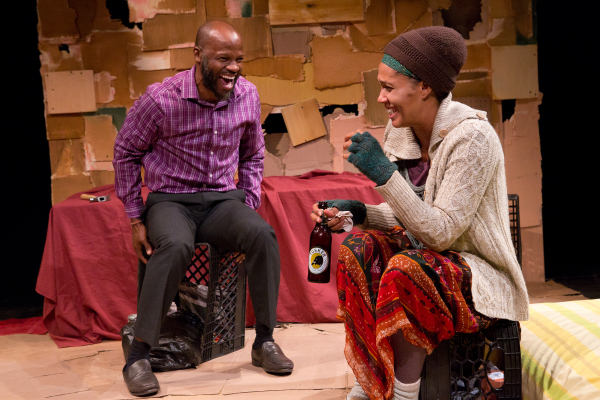Ndebele Funeral

(© Hunter Canning)
When it premiered at FringeNYC 2013, Zoey Martinson's Ndebele Funeral was a must-see, winning the Overall Excellence Award for Best Play. The limited nature of the Fringe (and the cozy seating arrangement in Teatro Circulo) ensured that not everyone who wanted to see it got to. Thankfully, this politically hard-hitting and lyrical play is receiving an extended run at 59E59 Theaters. The good news is that it has lost none of its original power and relevance. In fact, the performances of the three-person cast have only deepened over the past year.
Daweti (Martinson) is a South-African law-school graduate living in a shack in Soweto Township, on the outskirts of Johannesburg. She has few possessions beyond her broken dreams. Her home is a wreck, with garbage and empty beer bottles strewn across the floor. The one piece of furniture in the house in relatively good shape is a large and ornately decorated wooden box. Daweti is suffering from advanced-stage AIDS and this is the coffin she has built for herself, using materials sent by the ANC government for the purpose of constructing a new home.
When Thabo (Yusef Miller), an old university friend, shows up and discovers Daweti's squalid living conditions, he immediately embarks on an effort to clean up both her house and mood. The arrival of government worker Jan De Klerk (Jonathan David Martin), who has been sent to account for the building materials and survey the progress on Daweti's new home, threatens to derail Thabo's mission. The three characters weave through moments of poetry and politics as they attempt to navigate a brave new South Africa.
Martinson and Miller have a chemistry that makes you never question their long-standing friendship. Flashback scenes reveal how both have changed over the years, with the actors subtly altering their mannerisms: Thabo has found a new self-confidence (and wealth) in modern South Africa, and holds his head higher than he once did. Meanwhile, Daweti has lost much of her youthful optimism and now moves like an old woman. Martin embodies the sweaty and overwrought exhaustion of the young Afrikaner civil servant he's playing, furiously swimming against the tide of a country in which his white privilege is increasingly irrelevant.
Daweti's shack fits snugly into 59E59's Theatre C, the perimeter walls pressing right up against the audience. Scenic designer Jason Sherwood has added new details including a patchwork upstage wall of plywood and newspaper clippings. A droopy ceiling of plastic sheets hangs over the cardboard floor, acting as a poor man's skylight for Justin W. King's natural lighting, which instantly fades to surreal during the moments of spoken-word poetry.
These poetic moments (deftly integrated by director Awoye Timpo) are rich and full of surprises, as when the three performers incant a story that might be about Daweti, but might also be about something larger:
"With mosquito bites on her thighs and childless eyes
She was the answer to an unheard question.
A gift to an unknown future."
The actors recite the poem (which goes on to tell the story of an adored child slowly destroyed by abuse) while performing a Gumboot dance, maintaining a steady rhythm throughout. It's spine-tingling and beautiful.
Ndebele Funeral is distinctly South African, but the dialogue within Daweti's shack reflects global struggles and concerns, as billions of people stand at the divide between poverty and prosperity. Martinson has captured that chasm with uncommon sensitivity and a refreshingly unique voice.











